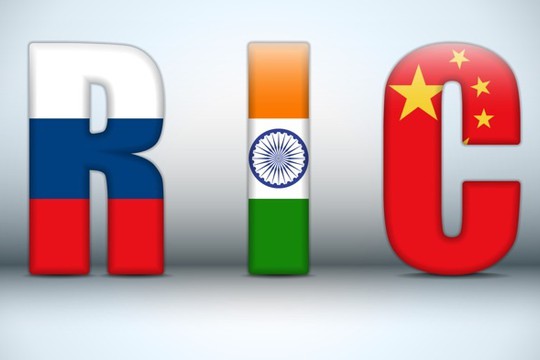Pic.: infobrics
The Russia-India-China alliance, initially conceived as a counterweight to the US, is being revived amidst Trump's trade war, Indian ‘The Economic Times’ stresses.
The Russia-India-China alliance, floated in the 1990s as a counterweight to the US, is being revived today as a way for the three countries to ride out the storm of President Donald Trump’s trade war. That reality will be on display this week when the three nuclear powers converge in Tianjin for the Shanghai Cooperation Organization summit. The Kremlin is pressing for a long-awaited trilateral meeting. If the troika did find new life, it would send a powerful signal that the geopolitical heavyweights are aligning in the face of US pressure.
That pressure is most acute for India. Until recently a key American partner, it has borne the brunt of Trump’s tariffs. He doubled duties on exports to 50% — due to go into effect on Aug. 27 — as punishment for its purchases of Russian oil.
Moscow first dreamed up the idea of RIC, as it was dubbed, in the 1990s. Then-Prime Minister Yevgeny Primakov proposed the formation of the group to challenge the US’s global influence. The coalition looked formidable on paper — three nations with huge economies and populations. In practice, it’s always been undermined by mistrust, above all between rivals India and China.
Among the biggest sticking points is their long-running border dispute. They’ve been at loggerheads over an ill-defined 3,488 kilometer (2,170 mile) frontier in the Himalayan region. Those hostilities erupted into a war in 1962, and continue to simmer today. In 2020, the two clashed violently in Ladakh’s Galwan Valley. Diplomatic ties froze, with New Delhi suspending tourist visas for Chinese nationals, and imposing restrictions on tech imports.
Trump’s tariffs are nudging them closer. Last week, they agreed to explore demarcating their disputed border, a key move toward resolving the territorial dispute. Strains around visas have eased and China has expressed solidarity with India on exports.
China is also far too close to Pakistan for India’s comfort. Beijing has become Islamabad’s most important defense partner since the end of the Cold War.
That hasn’t stopped Moscow from trying to rejuvenate it. In May, Foreign Minister Sergei Lavrov said “the time has come for the revival” of the troika. Beijing has also backed the initiative, saying it could uphold peace, security, and stability in the world.
Resurrecting the bloc could pose a challenge to the US if it resulted in more coordinated action. But what binds these nations is necessity, not trust. The gathering in Tianjin will offer the opportunity for the optics of warmer ties, but it will be more symbolism than substance. This is an inherently fragile partnership, one that could unravel if American pressure diminishes.
read more in our Telegram-channel https://t.me/The_International_Affairs

 11:42 28.08.2025 •
11:42 28.08.2025 •























